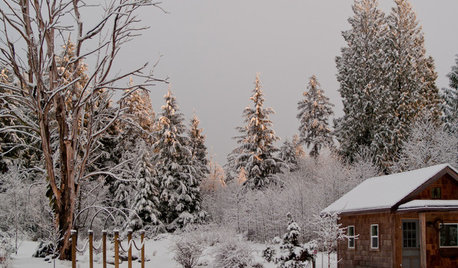New Year for Books--January Reading
My first book finished this new year is Tana French's The Secret Place, and once again she has had my total attention. This one is about a private girl's school in Dublin.
Comments (79)
frances_md
9 years agoMy first completed book of the year is a really, really good one -- well written, suspenseful, and almost impossible to put down. The Girl on the Train by Paula Hawkins was released yesterday and I finished it this morning.
While in reviews it has been compared to Gone Girl, I enjoyed this book much more and wish I could find more like it. The main character is an alcoholic whose narrative may or may not be the truth (even she doesn't know at times) and that makes the book more compelling. I don't want to say much about it and risk giving something away but it is definitely a book worth reading if you like suspense.
annpan
9 years agoMerryworld, thanks for that. I have requested it from the library. They can get it from another branch.
I am reading one of the Mike Befeler "Geezer" mysteries. They are quite amusing but I wish the "hero" wouldn't keep putting himself down so much, "old poop" annoys me in particular. That is what dogs do on the grass, also annoying if not cleaned up!Related Discussions
Katie's Krops - you gotta read about this 11 year old girl
Q
Comments (2)How inspiring,it only takes one person at a time to make a change in their community.TFS Kathi...See MoreAnyone read: A Year by the Sea by Joan Anderson?
Q
Comments (5)Yes, I have read "A Year by the Sea" and loved it. I have all Joan's books but haven't read the last one yet. I haven't been to one of her weekend retreats but I have seen her in person. I subscribed to her email and they sent me an invitation to see her speak locally (a couple of years ago). I found her to be geniune, honest and really a nice person. I want to spead a "season" in the Cape alone sometime. I'm not sure if I could do a year, but my dream is to rent a cottage for a season after I retire. I have a list of places and the Cape on right up there toward the top! Susan...See MoreWhat will you book group be reading this year?
Q
Comments (28)I just joined the book club about three years ago, and for the first two years I did not go on the trips due to conflicts with my own schedule. However, this year I will be going to Portland with the group - in fact I believe we are all going this year. I'm not yet sure which the associated book will be. Once we have found the book and the trip, we make a space in the reading schedule for it. I do know that we (they) have traveled all over the US. The first trip was to Savannah to meet the author of Midnight in the Garden of Good and Evil. There have been trips to Niagara Falls, Wyoming, Nashville, Key West, and Washington DC. Authors live everywhere! Rosefolly...See MoreHow many books did you read last year?
Q
Comments (23)I don't normally bother to count but am trying to take notice of what I do every day, like give myself marks out of ten for the quality of the dinner I made (never better than 8 as I am more of an arranger of food than a cook!) and keep a diary. It helps to exercise my brain. The count I did for this thread was helped by the local library, listing in alpha order the titles I have borrowed, thus warning me of anything I have read before in the last 5 years since the program was set up. After some 60 years reading adult books, there is a huge possibility of re-reading, as you may imagine. However I particularly like Golden Age mysteries and can still find some authors I have overlooked. Netla, did you ever get a copy of 'Penhallow'? I recall that you mentioned that you wanted to read it....See Morewoodnymph2_gw
9 years agoI've just finished "The Mockingbird Next Door" by Marja Mills. The author lived in the small Alabama town where Harper Lee wrote her classic, while researching the Lees and their culture. Mills described, as well, her illness with lupus during that time and the empathy the elderly Lee sisters shared with her. The book has a leisurely, slow pace, suited to the small-town way of life.Some "mysteries" are cleared up: the relationship of Harper (Nelle) Lee with Truman Capote, their collaboration on "In Cold Blood", and why Lee never wrote another novel. I had not known of Lee's close friendship with Gregory Peck and his French wife.
Now, I'm embarked upon reading one of the 5 texts for my current history class: "Sleuthing the Alamo" by James Crisp.Texas history is not my strong suite, as I know almost nothing about the history of the American West.
Already the course has me wanting to revisit Wallace Stegner and discover "Grapes of Wrath" (which I've never read).
carolyn_ky
Original Author9 years agoAfter reading the last Charlie Resnick book by John Harvey, I've been on a binge read of the ones I had missed. I have read two more and have another two waiting for me at the library. His city of Nottingham is a far cry from my romantic notions of Robin Hood.
The one good thing about having the coughing crud is that you can spend your days in the chaise longue and really get through the TBRs.
lemonhead101
9 years agoHey Wood - your class sounds fascinating to me. What is the focus of the class? I'm toying with the idea of doing some themed reading...
My reading has really picked up from last year when I was suddenly struck with a Reader's Block of some kind. (Horrifying, but true.) One of my most enjoyable recent reads was "The Diary of a Nobody" by Weedon Grossmith and his brother George Grossmith. Lots of things I loved about it: It's epistolary
It's Victorian
It's very dry humor that made me snort out loud when I was reading at the gym
It's not a mammoth page length
It was plain funIt's a fictional diary of a very ordinary lower-middle class man who works as a City Clerk, but is convinced that his life and its minutiae are riveting enough for someone somewhere at some time to publish his writing for posterity. He has endless minor social mishaps, worries so much about what people think about him... It's extremely funny in places. (Think of Basil Fawlty, Adrian Mole, Captain Mainwaring, Bridget Jones... all were influenced by this book.)
Anyway, very fun read if you're looking for one. Now I'm on to a very different fun read: Mary Roach's Packing for Mars. (Finished the Chris Hadfield book over the Christmas holiday - the Canadian astronaut who had a viral vid with him singing a cover of David Bowie's "Space Odyssey"...)
Here is a link that might be useful: Col. Chris Hadfield - Space Odyssey song in the ISS
woodnymph2_gw
9 years agoLiz, I'm enrolled in a course at the nearby college: "The History of the American West." It begins with the migrations of the various Native American populations and continues up until modern times. There will be a segment on the role of women in the pioneer days. The reading is very challenging already.
rouan
9 years agoI seem to be on a nonfiction roll lately. I am partway through the Byron book but have set it aside to read the Lost City Of Z by David Grann. It's the story of the author's search for the lost explorer Percy Fawcett, who set off in 1925 with his son and the son's best friend on a search for what he called the city of Z in the Amazon jungle. After a few months the reports from the expedition stopped and they were heard of no more. I heard about it on Science Friday (on NPR) and decided it was more interesting than Byron (for now at any rate lol).
ladyrose65
9 years agoI started the year with this book, Caterpillars of Eastern North America: A Guide to Identification and Natural History (Princeton Field Guides) Beautiful pictures. Now I won't need to ask so many questions in the butterfly forum.
veer
9 years agoHave just finished a Christmas-gift My Animals and Other Family by Clare Balding.
CB is a TV sport presenter and all-round 'good egg', brought up at her father's racing stables and keen on all things animal related. Her first pony was given to the family by HM Queen, although she enjoyed less kudos with Princess Anne after beating her in a ladies amateur race. Dark looks were directed by HRH at CB!One of our local banks has introduced a corner where second-hand books may be bought/exchanged; it certainly beats trying to get money out. I picked up for a few pence The Children's Hour by Marcia Willett. I had never heard of this author but she appears to be very popular among older/middle aged folk and writes in a 'style' similar to Rosamund Pilcher but perhaps with slightly more depth of character.
Once I had sorted out all the characters it was an enjoyable and undemanding well-written work . . . middle class family, all with arty, literary, interesting jobs, living in attractive country houses set in 'real' locations. The antithesis of the grim, Northern blue-collar/working class/down-trodden tales of hardship and woe that have been 'popular' for so long.
Willett must be a great dog-lover . . . all the animals have realistic characteristics and are great fun.annpan
9 years agoVee, About the bank....that is interesting. Is it a local thing with your branch or a general new idea to attract customers? Which bank is doing it? I am trying to imagine the publicity
Literature at Lloyds
Books at Barclays
Non-Fiction with the Natwest (Going upmarket!)
Etc!!rouan
9 years agoAnnpan, I work for a credit union (like a bank but member owned) and we have a table set up with books for sale. People donate their unwanted books and we sell them and donate all the funds to various local charities. Several of our branches do the same thing.
merryworld
9 years agoEnjoyed The Dovekeepers, though it didn't generate much discussion at book group. We're to read The Dinner by Herman Koch next. Not looking forward to it because, it seems to be one of those books where all the characters are horrible people.
I've been laughing out loud reading Three Men in a Boat: to say Nothing of the Dog by Jerome K. Jerome.
veer
9 years agoAnn, the bank in question is Lloyds. It is a fancy new building, behind the original simple facade, lots of empty space within and, of course, none of those solid mahogany counters or polite young women and aspiring bank-managers ie. clerks, in pin-stripe suits.
These days it is females in polyester blazers who direct you to machines that weigh your cash, dispense notes and offer you services you neither need or want. They are also trained to tell you that your 'paper work' has been sent to Bangladesh and 'lost' en route . . . as happened to my DH's account with the Natwest. ;-(
I think the old books are just there to fill up some of the vast unused space, although as rouan says the money does go to charity. I don't know if it happens in other branches.annpan
9 years agoMerryworld, I love that book too and there is a sequel "Three men on the Bummel" aka "Three men on Wheels" also very amusing.
There is a movie of the first book which you may be able to access.sheriz6
9 years agoI finally had some reading time this weekend and flew through The Life Changing Magic of Tidying Up and started As Chimney Sweepers Come to Dust (which is completely delightful - I adore Flavia de Luce and I'm trying not to rush through it).
The tidying up book had great advice for sorting and purging and truly, the most important info: where to start (always a problem for me). I will be applying her method to my clothes, definitely, and to my books -- though, like Frances, getting them all in one place would be impossible. We'll see how it goes. I do think it's a book that would work fabulously if you lived alone, but when you also have to deal with spouses, children and pets, it's a little less effective.
Vee, I've read a few of Marcia Willett's books and liked her a lot. We have a similar book sale system at our local grocery story, people drop books off and they are sold for fifty cents or a dollar with the collected money going to charity. It takes all my willpower to not stop and browse every time I go grocery shopping.
Lemonhead, Mary Roach is one of my favorite authors. I enjoyed Packing for Mars and received Gulp for Christmas. I can't wait to see what she comes up with next.
reader_in_transit
9 years agoThe Life-Changing Magic of Tidying Up sounds like something I could use, but I checked the library website and there are 679 holds for 115 copies (How to Be Both has 157 holds on 34 copies). It's good to know that people READ in this city. I'll have to wait until the frenzy dies down.
Reading now The Unlikely Pilgrimage of Harold Fry by Rachel Joyce. Harold has begun walking northward from southern England, to go to see an old friend in the northernmost part of England. The friend has cancer and Harold thinks that she will not die until he arrives (walking all the way). He has blisters on both feet.
lemonhead101
9 years agoDid a quick read of a short NF called "The Victorian Hospital" by Lavinia Mitton (great name!). As you can tell from the title, it's all about hospitals and how they evolved during Victoria's lengthy reign. At the start of the century, hospitals were nicknamed "Gateways to Death", which wasn't very hopeful, but as time and medicine progressed, they become a lot better. (Can't really say the same about insane asylums though. Awful places and once you're in, it was extremely hard to get out.)
Fascinating to see how medicine has progressed over history. I'm very grateful for the advances!
Now reading "Like One of the Family", an F by Alice Childress and published in the 1950's. It's from the perspective of an African-American maid via the format of her having a one-sided conversation (like a telephone call) with one of her best friends and how her day has gone. It's satirical and is supposed to be a must-read book in a lot of African-American-focused reading lists. With February being Black History Month in the US, I thought I'd read some related lit on that. Plus it was MLK Jr. Day yesterday and I went to my first Gospel concert last night. Intriguing on all levels!
carolyn_ky
Original Author9 years agoI'm reading The Beat Goes On, loaned to me by my daughter who is an Ian Rankin fan. It is a book of short stories featuring John Rebus, and it's always fun to fill in some blanks although I am not a short story fan.
sheriz6
9 years agoI finished the newest Flavia de Luce book, and it was wonderful. She's now been transplanted from England to a boarding school in Canada, and I thought the different setting and characters breathed new life into the series. She no sooner arrives at Miss Bodycote's Female Academy than a corpse tumbles out of her bedroom chimney, and the mystery takes off from there.
I was a bit worried Bradley was going to be wading into Gail Carriger Finishing School territory (her YA books feature a Victorian steampunk assassin's academy and are wonderful) but he kept to the tried and true murder/puzzle and Flavia (as always) carried the day. The overarching backstory -- who was her mother, really, and who was she working for? -- was advanced ever so slightly and I'd hoped for a bit more information, but ... Flavia is one of my very favorite fictional characters, and reading the book was like visiting an old friend.
The next book will have her back in England, and I'm looking forward to it.
carolyn_ky
Original Author9 years agoI'm reading The Devil in the Marshalsea by Antonia Hodgson. One of the blurbs on the back says, "At times Hodgson even rivals Dickens." Nah, but it is good. A young wayward son of a country parson gets thrown into debtors' prison.
twobigdogs
9 years agoLemon, Diary of a Nobody is one of my favorites. I was enthralled and glad to see that you enjoyed it as well. Have you read Idle Thoughts of an Idle Fellow by Jerome K Jerome? He is the same guy who wrote Three Men in a Boat which was mentioned this month. I thought Idle Thoughts was extremely amusing and laugh-out-loud funny as well.
I have to read Chef by Jaspreet Singh for book club. Not looking forward to it when I have so books on the growing TBR pile. Has anyone read it?
PAM
timallan
9 years agoI've been reading Eowyn Ivey's The Snow Child, which is a bit like a fairy tale for grownups. There is something a little bit spooky about it as well. I had to set it aside for awhile, due to being struck down by that awful flu which has been going around. Far from being able to languish on my sickbed, curled up with a good book, I found I was too sick to read.
yoyobon_gw
9 years agoI'm reading THE ENCHANTED WORLD OF ADAM HOPE .....very, very interesting story.
You won't put it down once you begin !!socks
9 years agoReading and loving DEEP DOWN DARK--The Untold Stories of 33 Men Buried in a Chilean Mine and the Miracle that Set Them Free.
Most everyone knows the story, and I didn't think it was necessary to read a whole book about it, but it is so well written and researched that I found it to be excellent. Good book for anyone who likes survival stories.
veer
9 years agoHave finished Marcia Willett's The Children's Hour; an enjoyable undemanding read once I had the many characters/relationships fixed in my mind.
For a recent (very bad) birthday I was given Watching the English by Kate Fox. I had noticed a couple of mentions of it here at RP some time ago and I think anyone who has any knowledge of how strange we English appear/are might be entertained by some of Fox's comments. I'm still on chapter one dealing with the 'weather'!
Another book received was The Shakespeare Thefts by Stephen Greenblatt the 'heavy' US scholar of all things related to the Bard.
He leads a 'team' searching out all the First Folio editions of W S's plays and goes into minute details about which page of which copy has an ink blot on the top left hand corner or how they can tell if a work had been ripped out of a chained library (look out for the big hole)
An excellent book to read last thing at night; sleep comes easily after one chapter.Carolyn, I must look out for the 'Marshalsea' book (shades of Little Dorrit?). I have been carrying out some ancestry research and found a distant Great great great grandfather languishing in Warwick Gaol; 'debtors side' in the 1850's. I noticed several inmates had their families living there with them. His family however were out and about trying to make a living selling tripe . . . another relative was a butcher so he must have provided the entrails. Eventually the poor wife must have gone mad as she died in the Lunatic Asylum, and he disappeared from the records. ;-(
annpan
9 years agoVee, why was it a bad birthday for you? Ceiling collapsed or a significant number of candles on the cake? Do tell!
I have been reading the Diva series by Krista Davis and am awestruck at the elaborate catering events she describes.
Weddings that seem to last several days with all the various functions and three wedding dresses needed for the bride before the honeymoon outfit even!
Some i'net friends and I were describing our cheap weddings after reading about how much people spend these days. I was beaten by one in Las Vegas that came in under $100 all up.veer
9 years agoAnn, ceiling collapses, leaking roofs, blocked chimneys etc are as nothing to us here despite a new roof being put on when we moved here in 1980. The number of candles on the cake was the worrying thing!
Sheri, I had never heard of Flavia de Luce so had to look her up. Seems the author is Canadian and had never been to England when he started writing. All his information was gleaned from back numbers of 'Country Life' and similar up-market magazines. ;-)
carolyn_ky
Original Author9 years agoVee, shades of Little Dorrit indeed, only worse. When I was 18-ish, I typed a quite lengthy family genealogy for an aunt-by-marriage and found not a single horse thief or con man among them. I figured the fix was in.
I'm reading the second Peter May island book, The Lewis Man. It is good, too. I read somewhere that his other books aren't as good as the three set on Lewis.
annpan
9 years agoVee, how do you make tea? I have just read a book in which a woman makes tea in the "British way" by pouring hot water into a cup through tea leaves in a strainer. Really?
I have never seen that done but this could have become the fashion since I left in 2003!veer
9 years agoAnn, it is almost always teabags, either in the pot or singly in a mug, these days, rather than the loose tea leaves of our youth, when it was made in a proper pre-heated pot and then poured through a strainer.
Was the book American? I haven't come across that strange method either!Carolyn, you must come from a very God-fearing family line. I have found debtors, two mad people, incarceration in the Work House, a very moving story of a young man 'Transported' to Van Diemen's Land, an illegitimate g g grandfather who's 'real' aristocratic family are now married into our Royal Family (I'm still waiting for the invitation to a Garden Party), several sets of publicans one of whom tried to bribe a Magistrate (a bad move) and one whole group as far back as 1612, when the Church register in their village started, who went no-where and did nothing except make nails and procreate.
On top of that lot I have all the forebears on my American 'side'; but that is a whole different story ;-)annpan
9 years agoVee, yes it was in a book by Krista Davis, an American author. Perhaps someone told her that it was a British thing or she went to somewhere in the UK where this was done.
I must confess that I make tea with bags but Twinings, actually...
A tad expensive but I can get two cups out of the gorgeous Russian Caravan bags!woodnymph2_gw
9 years agoVee, thanks for the mention of the Stephen Greenblatt book. I already read one of his research books on the Bard and found it convincing.
I've seen a few Americans make tea, using it loose. They usually use a small metal "thing-y" for the leaves and somehow steep that in the hot water. Strangely enough, now, in America, the herbal teas seem to be dominating the market (camomile for sleep, lemongrass for goodness knows what, etc. etc.) I really like the strong Yorkshire tea which is not that easy to find in the USA.
I'm sure there must be a few cattle thieves in my Scottish ancestry. Who knows what my Irish ancestors were up to?. The English and Welsh part of my genealogy tended mostly in the direction of school teachers, ministers, and librarians.
friedag
9 years agoTo keep myself off Martin's thread discussing How to be both, I will mention here a couple of things I am currently reading:
The Third Horseman: Climate Change and the Great Famine of the 14th Century by William Rosen
The 14th century was a disaster for Europe which included The Plague, but the bigger killer and grief-maker was the series of famines that began in 1315. In May of that year rain started falling in northern Europe and didn't let up until August. The following winter was a bone-chiller that Europeans alive then hardly knew how to contend with because they had never experienced anything like it. You see, they and their immediate ancestors had been basking for four centuries in The Medieval Warm Period.I find ancient climate change much more interesting than the alarmism of today's debate. It's because, I suppose, the old hostilities have receded and the contemporary ones keep getting nastier.
Eating in America: A History by Waverly Root and Richard de Rochemont
This was first published in 1976 and is considered something of a classic. Most things in it are still considered true.This delights me:
In 1776, "the Representatives of the UNITED STATES OF AMERICA" adopted the Declaration of Independence...The Declaration ended only one sort of link with England...America did not declare, did not desire, and did not attain independence in many other domains.
Specifically, the United States retained the English legal philosophy and the linguistic connections, two aspects of Englishness almost universally admired. But there was a third aspect of England that the U.S. retained: its cooking and food preferences which were not much admired by anyone but the English themselves. So why did English and later cookery from other parts of the British Isles continue to be the mainstay, indeed the personification, the basis of what we still consider 'American' food? Root and de Rochemont explain it in their enlightening and amusing book.Carolyn, The Devil in the Marshalsea sounds interesting, although to my knowledge I don't have any debtors in my family who experienced those awful circumstances. I need a good historical novel to read just now!
carolyn_ky
Original Author9 years agoMy typing was for an aunt by marriage (she was very prim and proper, BTW), so who knows what my own ancestors got up to. I knew one great-uncle who was a lifelong alcoholic and "rode the rails" during the Depression. For my overseas friends, that means hopping freight trains for free transportation across the country and living a hobo life.
Picked up two more John Harvey books from the library and have begun one of them. I would hate to tell you what time I went to bed last night due to finishing The Lewis Man.
veer
9 years agoMary, an apology. The Shakespeare Thefts was by Eric Rasmussen not Stephen Greenblatt. I should learn to study book-covers more closely.
My copy has a parchment-like design with curly Elizabethan writing, quill pen etc. and a large blob of ink at the bottom where ER's name is written. SB's name appears at the top in red with some blurb about the wonderfulness of the book . . . which seems to be a growing 'trend' among publishers. Anyway it is no excuse for my lack of care; sorry!yoyobon_gw
9 years agoBack to the earlier mention of Flavia DeLuce stories.......I read the first book and enjoyed it and started the second.
However....there is something ever so annoying about the precociousness of this 11 year old girl.
The stories were written by the author when he was 70 and I think he took great liberty with the intelligence and wit of this age !
She vacilates between being a naive young preteen obsessed with disliking her older sisters and being a very savvy observer of the world and people.
Delightful to read if you suspend all beliefs about how an actual child would think and act.woodnymph2_gw
9 years agoFrieda, like you, I am fascinated by early climate changes globally. In fact, in 3 of my college courses recently taken, we touched upon that very issue. Around the time of the great plague, there was also an increase in the burning of "witches", as these were believed to be one cause. Not only did Europe experience the "Little Ice Age" but also the Western part of North America did, giving rise to more migrations of nomadic peoples who displaced various other native Americans. And, I'm sure you are aware of the "warming" period that preceded this, that enabled the Vikings to settle in Greenland in several colonies.
lemonhead101
9 years agoHi PAM -
I've read "Three Men in a Boat" (which was really funny) and had forgotten about his other works, so thanks for the reminder! Always good to add some levity to the TBR pile choices.
One of my recent reads has been an older book that has been on my TBR shelf for quite some time (mumble, mumble) and as part of my Black History Month reading, I picked it up and loved it. (Why do I keep such great books unread on my shelf for sooooo long?)
Merle and Other Stories by Paule Marshall was a collection of short stories and a novella ("Merle") and it was a very enjoyable read. She's an author from Barbados who has lived (and I think spent some childhood) in Brooklyn during the 1930's and 40's, and it's about immigrant life in the brownstone communities back then. Really good writing and a total pleasure to read. So much so that now I've picked up one of her earlier novels (and perhaps the most well known): Brown Girl, Brownstones, a Virago publication. (Unusually for a Virago, this one is not at all prickly so far.) The story reminds me of a Barbados version of "A Tree Grows in Brooklyn" in some ways. Just loving it and wow, the writing is great.
Then picked up a graphic novel about the 1950's start of the Civil Rights movement in the US and called "March: Book One" by John Lewis who is now a respected US Senator, I think. Autobiographical as he played an early role in the struggle and knew MLK Jr., so it's interesting to learn his "I was there" perspective. It's shameful that people, American citizens, were treated in this manner back then, so glad it's improved for the most part.
And then, over the weekend, one of our library branches held an afternoon Readathon (as part of National Readathon Day). What this meant was that the library kindly laid out lots of delicious food and drink, and we, as patrons and participants, just had to sit down and read for a few hours. They promoted the event as a "reading party" and it was so much fun. I hope they repeat it again. Have any of you participated in a readathon or a reading party before?
friedag
9 years agoMary, I think the most succinct account of the Norse Greenlanders' travails I've read is in Jared Diamond's Collapse: How Societies Choose to Fail or Succeed. Erik the Red's colonization of the East Settlement and the West Settlement (confusing names because they both are on the west coast of Greenland) would never have happened before 900 AD or after about 1200 AD. There was a window of opportunity and for a while the Norse Greenlanders did very well. They even built themselves a cathedral and had their own bishop. But their downfall came because of the onset of The Little Ice Age and their own stubborn inadaptability: they had been dairy farmers in Norway and they wanted to be dairymen in Greenland too. There were vast grassy meadows, so why not? They held on so persistently to their love of milk, butter, and cheese that they hardly bothered to diversify their skills.
Unfortunately, the Norse also lived in Greenland at a time when the Inuits had either temporarily abandoned Greenland or they had not yet arrived there (maybe Greenland's climate at the time was too mild! for their purposes). If the Norse had had contact with the Inuit, they might have learned better survival techniques of hunting and fishing, Inuit-style. The Norse weren't cowards, but they were very European in their mindset and that is what doomed them.
One of the most poignant findings of the archaeological study of West Settlement(?) was the dairy cows' hooves inside what was their byre, and the hooves were the only parts of the animals still recognizable. The people must have been desperate to have killed their cows, the creatures being their whole livelihood. No human remains were found so the people didn't wait there to die of starvation. They went somewhere, but so far no trace of them has been found. It's one of those mysteries like John White's Lost Colony. Btw, Mary, you probably know about the site found in North Carolina that could be evidence of those colonists. The artifacts found are of the right period. I love this sort of thing!
I was recently at Mesa Verde. This was my sixth or seventh time to go there. Previously I had always hiked down the trail with the guide, but my old knees wouldn't let me this time. I stayed in the visitors' center and read the literature in the bookshop. The same biography Richard Wetherill: Anasazi by Frank McNitt is still sold there, although Anasazi is now a politically incorrect term. It means something disparaging, but I can't remember the translation. The next day my family and I went to Chaco Canyon where I have very fond memories of being a young university student in love with anthropology and archaeology. Anyway, the people of Mesa Verde and Chaco are another group of the "lost" victims of climate change. Will you be studying them, Mary, in your current class about the American West?
annpan
9 years agoYoyobon, I didn't like the first Flavia de Luce and dumped it after a short read. It didn't sound "right" and I was uncomfortable with it. Now I have been given some background about the author I can understand what I felt was "clunky" about the writing!
I haven't mentioned this before as many people enjoy the series so I thought it must be ME!!rouan
9 years agoI picked up an interlibrary loan book at the library yesterday and started it last night. I've been a fan of Elizabeth Peters' Amelia Peabody series for years and the author mentioned that the inspiration for AP came from a real person named Amelia Edwards, who wrote a book called 1000 miles up the Nile. She went up the Nile in a dahabeeyah (basically a houseboat) and explored various Egytpian sites. I finally decided to order this book and read it for myself. I've only made it through a couple of chapters so far; her writing is extremely verbose and descriptive but once I'm used to it, I'm sure I'll be able to finish it.
yoyobon_gw
9 years agoAnnpan,
I didn't hate the first book or his writing in general.
She's very witty and clever and the story itself was engaging.
BUT.....she just didn't think or act like any 11 year old I've ever known.
I think of her more as a young Maisie Dobbs.carolyn_ky
Original Author9 years agoThere are evidently several of us keeping quiet about Flavia de Luce. I only read the first one, too. She was too precocious by half for me.
woodnymph2_gw
9 years agoFrieda, I will have to find that Diamond book. Yes, we have briefly touched upon the Anasazi in the course I'm taking on the American West. It seems that severe drought did them in, for the most part. I read that their name meant "ancient ones." I would certainly love to see those multistoried dwellings (the first high-rise apartment buildings in America!). Clearly, they were well defended from their enemies, but the irony is that the climate changes were their downfall.
friedag
9 years agoUpdate: Mary, I reread the part about the Greenland Norse in Diamond's book Collapse, and this time picked up on something that I must have forgotten previously. Apparently there had been at least four waves of Native American hunter-gatherers who preceded the Inuit who came and went from Greenland because of similar climate vacillation that the Norse eventually experienced. The Norse did encounter native peoples at some point but it is not completely clear if the Skraelings were proto-Inuit or Inuit. Unfortunately these meetings did not go well and the Norse inclination to bellicosity certainly didn't help.
Diamond speculates -- plausibly, I think -- that the surviving Norse of Western Settlement fled to the Eastern Settlement, but the Eastern Settlement had its own problems and would have been overwhelmed by the migrants. (The names Western/West Settlement and Eastern/East Settlement are used by different historians.)
Yes, "ancient ones" is the most common euphemistic meaning of Anasazi. Another is "old-time strangers." However, I looked it up and found that Anasazi is a Navajo word meaning "ancient enemies," sometimes enhanced with other uncomplimentary adjectives from the Navajo language. The guides at Mesa Verde give a little speech to visitors who don't know any better than to refer to the cliff-dwellers as Anasazi, but they, the guides, will not be saying it and they encourage others to refrain from it as well. However, I don't think the word will go away in common usage any time soon.
Have you read Charles C. Mann's 1491: New Revelations of the Americas Before Columbus? Among many things that I was not aware of:
The Amazon rainforest is largely the result of intentional plantings by pre-Columbian natives, perhaps beginning thousands of years ago. It's a giant orchard!
The "Indians" of North and South America (perhaps Mesoamerica as well) deliberately set fire to the plains grasses and forest undergrowth as part of their "land management."
What texts are you using in your American West study? I'm always curious!sheriz6
9 years agoCarolyn & Annpan, I completely understand that Flavia de Luce might not be everyone's cup of tea, so please don't keep quiet on my account, I certainly wouldn't take offense. One of the things I like best about RP is how we can share differing opinions without acrimony.
I know the Flavia character is precocious (perhaps annoyingly so), but I just find her so funny and endearingly awkward (esp. when she starts waxing lyrical over poisons and chemical compounds) that I've become a die-hard fan and look forward to each new book.
Frieda, I have both Collapse and 1491 in my TBR pile (currently in boxes - I'm having built-in bookshelves installed and everything is a mess right now). I wasn't sure what to read next, so I'll have to pull them out once the dust settles.
woodnymph2_gw
9 years agoFrieda, what did Mann and Diamond have to say about the Vikings who came to settle L'Anse aux Meadows early on? I read that they encountered the Skraelings there, as well.
Here are the texts for my present course. Of course, we read primary sources, as well.
"Beyond the Missouri" (Etulain)
"Sleuthing the Alamo: Davy Crockett's Last Stand and Other Mysteries of the Texas Revolution" (Crisp)
"Encounters at the Heart of the World" (Fenn)
"Frontier Women: Civilizing the West?" (Jeffrey)
"Violence in the West: The Johnson County Range War and the Ludlow Massacre" (Johnson)rouan
9 years agoI put 1000 miles up the Nile aside to read a book I found at the library when I picked up a book that I had placed on hold. Funnily enough, it's another nonfiction, entitled The Big Tiny by Dee Williams. A number of years ago the authored decided to downsize her life and build (and live in) a tiny house from the bottom up. This book covers what led her to make that decision and how she built the house.
It was interesting reading and caused me to reflect on my own lifestyle. Although I can understand and applaud her decision, I know I wouldn't be able to follow suit. For one thing, I would have to get rid of nearly all of my books and there's no way that's going to happen!
annpan
9 years agoRouan...I am with you on that one.
In my retirement village villa, I have two tall bookcases in the main room and piles of books on the sofa ends, coffee tables etc.
I promised myself to have a "one bought, one tossed" attitude but have done a Scarlett O'Hara on that!
Which beloved book can I toss?merryworld
9 years agosheriz6, I'm a Flavia fan, as well! Haven't read all the books yet, and I think some are better than others. The Weed That Strings the Hangman's Bag has been my favorite so far. The newest one sounds like a good one. I liked the Amazon Essay Alan Bradley wrote about how, "Flavia de Luce walked into my life one winter day, parked herself on a campstool, and refused to be budged."













annpan